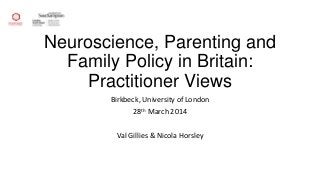
Brain science and early intervention nicola horsley
- 1. Neuroscience, Parenting and Family Policy in Britain: Practitioner Views Birkbeck, University of London 28th March 2014 Val Gillies & Nicola Horsley
- 2. Brain Science & Early Intervention Project – Research with Practitioners Interviews with health & early years practitioners: • Family Nurse Practitioners x 8 • Children’s Centre Workers x 7 • Health Visitors x 2
- 3. The Family Nurse Partnership Programme of Early Intervention • The Nurse Family Partnership (NFP) has been running early intervention programmes with disadvantaged young mothers in the US, and testing their efficacy with its own randomised control trials since 1977. • In 2006, the UK government (through the Social Exclusion Unit) established ten demonstration sites that would test the NFP in England, where it was to be called the Family Nurse Partnership (FNP), under licence from NFP. • There are now FNPs in 91 areas in England, run by NHS trusts and social enterprises. • FNP nurses receive continuous training to ensure fidelity to the NFP model.
- 4. Frustrations of Being Outside the Neuroscience Loop A number of times I’ve gone on courses actually, and they’ll be saying ‘Oh, yeah ... neuroscience is a big thing. It’s going to change how we teach children’, and you’re going ‘oh, it sounds really exciting. Who’s doing that then? Where can we read about it?’ and actually no one delivering the courses ever knows. (Children’s Centre Manager) For baby massage I did a conference in London a few years ago and we had talks from various – Sue Gerhardt, … very much looking at the development of the brain. It was quite frustrating sitting there thinking it hasn’t yet hit health visiting, it hasn’t hit mainstream knowledge yet … So finally, hallelujah, a few years later coming into our practice and these books that we can quote people that we can turn to in increasing our knowledge, and it’s something that is vitally important but we obviously need that passed all the way through… But no one ever actually tells us how we can intervene or what we can do. (Health Visitor)
- 5. “A Picture Says a Thousand Words” Those two brain scans, the child is being loved, the child is being neglected, and it’s almost like the picture says a thousand words, doesn’t it… But I think just brain science, that photograph shows to me so much, and it gives me so much passion in what I’m doing... I think it really gives me that bumph to stick by it, rather than just give in to what society might think is okay, so we’ll stand by it and give more definite ‘this is the right thing to be doing’. (Children’s Centre Manager)
- 6. Brain Science as Justification of Spending During Austerity The reality is our service is expensive. We have to be clear that what we’re doing works and there’s a reason for what we’re doing so we have to justify it hugely so it’s *got to be+ absolutely clear that this early period makes a huge impact to people’s whole lives, prison populations, all those sort of things in the future. (Family Nurse Partnership Supervisor)
- 7. Brain Science as Re-framing Risk I knew physical violence was dangerous, but I hadn’t thought of stress as being dangerous prior to that training. And when I realised what cortisol, the mother’s cortisol levels would do to the baby, specifically the baby’s brain made me think no actually it’s not about keeping a baby once their born safe, it’s how do we antenatally keep this baby safe. (Family Nurse Partnership Practitioner)
- 8. Breaking Cycles A lot of these young people have had complicated young lives and maybe if left just to their own devices just to bring up their new baby they would repeat patterns that they’d had in their young childhood. This program gives them well researched advice and an opportunity to discuss a different way of parenting this new baby. So just break cycles of behaviour and patterns of behaviour that have grown up within families through generations…..The more we know, the more we understand. The more appropriate support can be given to perhaps try and break what previous generations have, how they’ve acted. To help the biological processes play out in the way they’re meant to when you’re doing everything you should have done. So I think it would have a big impact on a lot of people if they knew as much as perhaps we do. (Family Nurse Partnership Practitioner)
- 9. Breaking Cycles Really the aim of the group’s to improve their self-esteem which, hopefully, will improve their family self-esteem, to think about out of the box, where they might have been brought up with a completely different value. So it’s putting some values that they might not have thought about like education, getting a job, all those things, they might have never had that because their whole family might have always been on income support. (Children’s Centre worker)